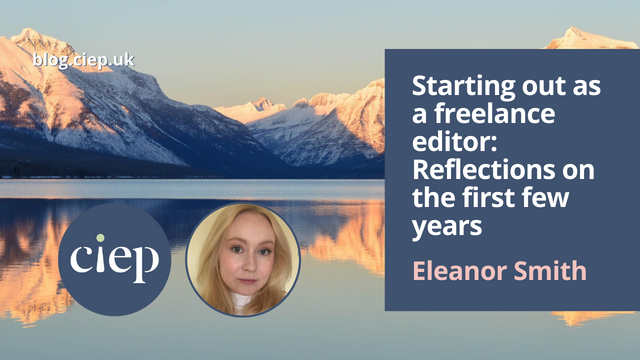Now at the four-year mark of her freelance career, proofreader and copyeditor Eleanor Smith reflects on the ups, the downs and the lessons learnt – and offers an insight into starting an editorial business.
Having reached the four-year milestone with my editorial business, it feels right to mark the occasion by doing a touch of self-reflection on my freelance journey so far. Hopefully other editors will gain something from reading about my editorial escapades – whether that’s a dose of empathy or perhaps some guidance if you’re only just starting out yourself.
In this post, I will cover:
- leaving full-time employment
- taking my first steps as a freelance editor
- an unexpected roadblock
- choosing whether to specialise
- celebrating the wins
- lessons I’ve learnt.
My background and leaving full-time employment
From about age 13, I knew I wanted to work in the publishing industry. Books had always been an important part of my life, with regular trips to the library as a child to pick out that week’s adventures.
With that in mind, I got my degree in English literature and took some courses with the CIEP (then SfEP). But after a month of editorial work experience in a well-known publishing house in London, I realised the capital city life wasn’t for me.
So when I saw a job for a proofreader in a marketing agency pop up in my home town, I was thrilled. I could still use my editorial skills after all – without leaving home! Before long I was busy editing content and should have been loving every minute. But a toxic atmosphere can ruin even the best role …
It was only when the job began to impact both my physical and mental health that I knew it was time to tread a different path. Of course I was nervous, but I felt taking the ultimate risk and going it alone would be worth it. I knew if I didn’t give freelancing a try, I would always be wondering ‘What if …?’
Baby steps
Now it was time to take my first tentative steps into the freelance editing world. Straight away I rejoined as a member of the CIEP and took another proofreading course to sharpen my skills and increase my confidence.
When there’s no income on the horizon, you start to panic a little. So I sat down and made my first plan: exploring different avenues of finding work and deciding what kind of projects I wanted and was able to take on as a relative newbie.
I researched just about every publishing company in the UK (and some overseas too), set up alerts for freelance editing jobs and looked into several online directories. Slowly, my business started to take shape. I had made contacts, figured out what I wanted to do and set my own pace.
A temporary halt in proceedings
A year into working as a freelancer, I encountered an unexpected roadblock: the pandemic. It turned out it was not a great time to have a young business just beginning to spread its wings. Like many, I was faced with deadlines being pushed back indefinitely and found myself with a lot of unwelcome free time.
What this situation did was present me with a valuable lesson. When you’re self-employed, some months will be more successful than others. I used this time to address some of the tasks that had been shoved to the bottom of the pile – the ones that would eventually make it quicker to come out of this dry spell.
I set about updating my CV and directory entries, contacting different publishers, exploring new ways to enhance the services I offer and finding tools to make editing more efficient. I had to keep a positive mindset and believe that the work would return – and thankfully, it did.
To specialise or not to specialise?
I knew that a lot of editors choose to specialise in a field where they have previous experience, but as my degree was broad and I wanted to step away from the marketing world, I could go in any direction.
From educational children’s material to novels and puzzles, I’ve worked on a wide range of literature, and I can’t say whether I’ll choose to specialise further just yet. For now, I relish jumping between genres, gladly switching from books about history to fantasy epics to gritty crime.
The point I am trying to make is that it’s okay to choose only one route and stick to it, but it’s also perfectly okay to do a bit of wandering and see what captures your interest along the way. I’m still in the latter camp.
Celebrating the wins
When you work for yourself, there is no boss to give you external validation. No one is patting you on the back for a job well done (unless you do it yourself – no judgement here). Because of this, it can be easy to skim past the wins and, in doing so, fail to acknowledge them.
Over the last four years, I’ve struggled to celebrate these wins (even when I achieved Professional Member status with the CIEP!). Often I became so focused on where the next project was coming from, I didn’t take the time to pause and appreciate what I had achieved so far.
Being your own biggest cheerleader is a great asset as a freelancer, and while I still experience the occasional wobble, I’m finding this gets easier with time.
Lessons learnt (the hard way!)
Starting an editorial business is not an easy endeavour, and I will admit that my naivety has landed me in a few, shall we say, unfavourable situations. If you’re early in your freelance career, perhaps I can help you avoid these snags and keep your metaphorical knitwear intact.
Here are some memorable lessons I had to learn the hard way:
- Early on, I offered to work on a book for free as a trial, with the hope of receiving repeat work from this particular publisher. I excitedly completed the job, got great feedback, then never heard from them again. Lesson learnt: only offer to do a short free sample!
- After a client was late paying my invoice, I still took on more work with them and had to keep pestering them to pay. Lesson learnt: don’t give clients too many chances when it comes to payment. If an agreement is made at the start of a project, they should stick to it.
- When a client asks for a timescale, give your timings a little padding. Better that than having to put in extra-long shifts in a panic to get an edit done on time. Lesson learnt: offer a realistic deadline rather than the one you think the client wants to hear.
Next steps
I’m excited to see where the next four years take me. I plan to continue honing my craft further with more courses, figuring out which projects excite me the most and trying out ways to market myself – something I’ll admit I find difficult, as it’s easy to compare yourself to other editors.
Does the impostor syndrome ever go away? I will let you know if it happens!
About Eleanor Smith
Eleanor Smith is a freelance proofreader and copyeditor based in Somerset with a passion for films, musicals and cats, the latter being her favourite breed of co-worker. A Professional Member of the CIEP, she applies her editorial skillset to an eclectic mix of projects, from children’s educational books to crime, fantasy and historical fiction.
 About the CIEP
About the CIEP
The Chartered Institute of Editing and Proofreading (CIEP) is a non-profit body promoting excellence in English language editing. We set and demonstrate editorial standards, and we are a community, training hub and support network for editorial professionals – the people who work to make text accurate, clear and fit for purpose.
Find out more about:
Photo credits: header image by Pixabay on Pexels, woman taking notes by Ivan Samkov on Pexels.
Posted by Eleanor Smith, blog assistant.
The views expressed here do not necessarily reflect those of the CIEP.


